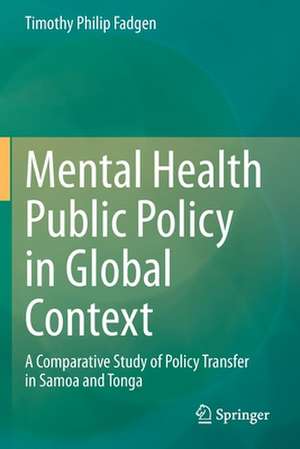Mental Health Public Policy in Global Context : A Comparative Study of Policy Transfer in Samoa and Tonga
Autor Timothy Philip Fadgenen Limba Engleză Paperback – 17 sep 2021
This book explores the development of mental health systems in the Pacific Island Countries (PICs) of Samoa and Tonga through an examination of several policy transfer events from the colonial to the contemporary. Beginning in the 1990s, mental health became an area of global policy concern as reflected in concerted international organisation and bilateral aid and development agendas, most notably those of the World Bank, World Health Organization, and the governments of Australia and New Zealand. This book highlights how Tonga and Samoa both reformed their respective mental health systems during these years, after relatively long periods of stagnation.
Using recent scholarship concerning public policy transfer, this book explains these policy outcomes and expands it to include consideration of the historical institutional dimensions evidenced by contemporary mental health systems. This book considers three distinct levels of policy implicated in mental health system transfer processes from developed to developing nations: colonial authority and influence; decolonisation processes; and the global development agenda surrounding health systems. In the process, the author argues that there are in fact three levels of policy change that must be accounted for in examining contemporary policy change. These policy levels include formal policy transfers, which tend to be prescriptive, involving professional problem construction and the designation of appropriate state apparatus for curative or custodial care provision; quasi-formal transfers, which tend to be aspirational and involve policy instruments developed through collaborative, participatory processes; and informal transfers that tend to be normative and include practices by professional actors in delivering service merged with traditional cultural beliefs as to disease aetiology as well as reflecting a deep understanding of the cultural context within which the services will be delivered. This book argues that a renewed focus on the importance of public policy and government institutional capacity is necessary to ensure human rights and justice are secured.
| Toate formatele și edițiile | Preț | Express |
|---|---|---|
| Paperback (1) | 778.13 lei 6-8 săpt. | |
| Springer Nature Singapore – 17 sep 2021 | 778.13 lei 6-8 săpt. | |
| Hardback (1) | 784.13 lei 6-8 săpt. | |
| Springer Nature Singapore – 16 sep 2020 | 784.13 lei 6-8 săpt. |
Preț: 778.13 lei
Preț vechi: 948.95 lei
-18% Nou
Puncte Express: 1167
Preț estimativ în valută:
148.89€ • 155.46$ • 123.23£
148.89€ • 155.46$ • 123.23£
Carte tipărită la comandă
Livrare economică 04-18 aprilie
Preluare comenzi: 021 569.72.76
Specificații
ISBN-13: 9789811564819
ISBN-10: 9811564817
Ilustrații: X, 221 p. 4 illus.
Dimensiuni: 155 x 235 mm
Greutate: 0.33 kg
Ediția:1st ed. 2020
Editura: Springer Nature Singapore
Colecția Springer
Locul publicării:Singapore, Singapore
ISBN-10: 9811564817
Ilustrații: X, 221 p. 4 illus.
Dimensiuni: 155 x 235 mm
Greutate: 0.33 kg
Ediția:1st ed. 2020
Editura: Springer Nature Singapore
Colecția Springer
Locul publicării:Singapore, Singapore
Cuprins
List of Common Abbreviations.- Chapter 1.Introduction.- Chapter 2.Setting the stage for discussion: how do public policies move?.- Chapter 3.What is ‘mental health’ and is it a universal concept?.- Chapter 4.Is there a global mental health policy system and what is it?.- Chapter 5.Samoa’s Mental Health System in Historical Context.- Chapter 6.Tonga’s Mental Health System in Historical Context.- Chapter 7.Conclusion.- Glossary.- Appendix.
Notă biografică
Tim Fadgen is a Lecturer in Public Policy at the University of Auckland. Dr Fadgen holds a PhD in politics and international relations from the University of Auckland and a law degree from the University of Maine. He has practiced law in the United States and in the Pacific Islands and is currently the deputy director of the University of Auckland’s Public Policy Institute where he teaches courses on public policy analysis and comparative public policy.
Textul de pe ultima copertă
This book explores the development of mental health systems in the Pacific Island Countries (PICs) of Samoa and Tonga through an examination of several policy transfer events from the colonial to the contemporary. Beginning in the 1990s, mental health became an area of global policy concern as reflected in concerted international organisation and bilateral aid and development agendas, most notably those of the World Bank, World Health Organization, and the governments of Australia and New Zealand. This book highlights how Tonga and Samoa both reformed their respective mental health systems during these years, after relatively long periods of stagnation.
Using recent scholarship concerning public policy transfer, this book explains these policy outcomes and expands it to include consideration of the historical institutional dimensions evidenced by contemporary mental health systems. This book considers three distinct levels of policy implicated in mental health system transfer processes from developed to developing nations: colonial authority and influence; decolonisation processes; and the global development agenda surrounding health systems. In the process, the author argues that there are in fact three levels of policy change that must be accounted for in examining contemporary policy change. These policy levels include formal policy transfers, which tend to be prescriptive, involving professional problem construction and the designation of appropriate state apparatus for curative or custodial care provision; quasi-formal transfers, which tend to be aspirational and involve policy instruments developed through collaborative, participatory processes; and informal transfers that tend to be normative and include practices by professional actors in delivering service merged with traditional cultural beliefs as to disease aetiology as well as reflecting a deep understanding of the cultural context within which the services will be delivered. This book argues that a renewed focus on the importance of public policy and government institutional capacity is necessary to ensure human rights and justice are secured.
Caracteristici
Discusses global mental health policy against context of Pacific Island Countries
Explores the historical development of mental health systems
Identifies and examines how colonialisation has institutionalised contemporary mental health systems
Explores the historical development of mental health systems
Identifies and examines how colonialisation has institutionalised contemporary mental health systems
